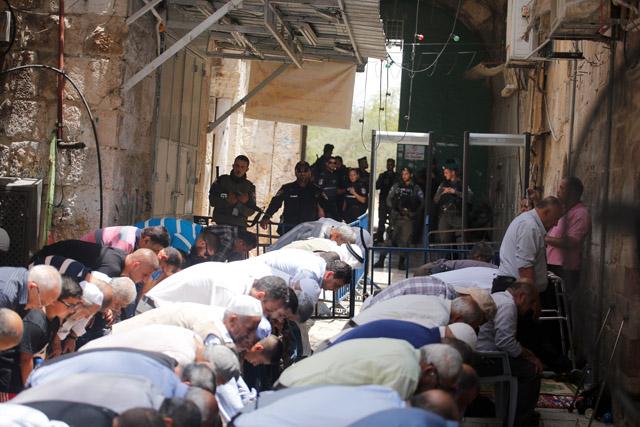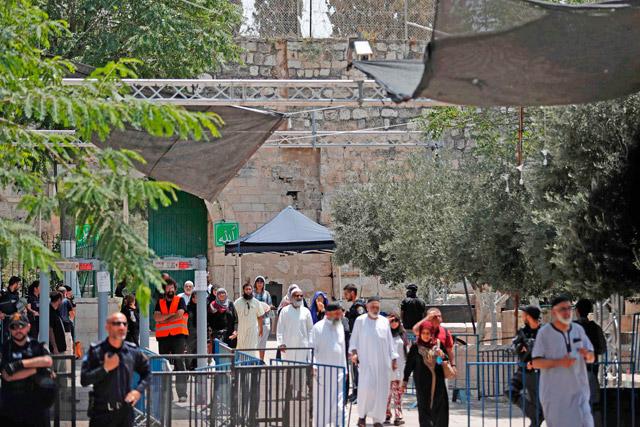You are here
Palestinians die in new confrontations over Jerusalem holy site
By AFP - Jul 24,2017 - Last updated at Jul 24,2017
OCCUPIED JERUSALEM — Two Palestinians died in confrontations with Israeli forces Saturday as the army moved in to seal off an attacker's home after violence over measures at an ultra-sensitive holy site.
The UN Security Council will hold closed-door talks Monday about the spiralling violence after Egypt, France and Sweden sought a meeting to "urgently discuss how calls for de-escalation in Jerusalem can be supported".
The deaths followed bloodshed on Friday, when a 19-year-old Palestinian killed three Israeli settlers in the occupied West Bank and three Palestinians died in confrontations with Israeli forces.
On Saturday, Palestinian youths hurled stones and petrol bombs as the army used a bulldozer to close off the 19-year-old attacker’s West Bank village and prepare his house for probable demolition.
Israel frequently punishes the families of attackers by razing or sealing their homes as a deterrent, although rights groups say this amounts to collective punishment.
Confrontations also flared in East Jerusalem and other Palestinian villages in the West Bank near Jerusalem, police said, adding that anti-riot measures were used against them.
At the Qalandiya crossing between the West Bank and Jerusalem, at least eight Palestinians were wounded, the Palestinian health ministry said.
A Palestinian died of wounds suffered in confrontations east of Jerusalem, the ministry said.
It said 17-year-old Oday Nawajaa was hit by Israeli live fire at Al Azariya.
Another Palestinian, 18, died nearby when a petrol bomb exploded prematurely.
Israel’s Shin Bet internal security agency meanwhile said on Sunday it had arrested 25 men active in the Hamas group that rules the Gaza Strip.
The arrests included “senior members”, a Shin Bet statement read, and was part of the security forces’ preventive measures in the wake of “the tensions around the Temple Mount [Al Haram Al Sharif/Al Aqsa Mosque]”.
Also Sunday, a rocket fired at Israel from Gaza exploded mid-air, the Israeli army said, causing no injuries.
No Palestinian group claimed responsibility for the projectile.
The violence was triggered by measures including metal detectors at the entrance to Al Haram Al Sharif/Al Aqsa Mosque compound, known to Jews as the Temple Mount, ahead of the main weekly Friday prayers.
Israel imposed the measures after a gun and knife attack killed two Israeli forces on July 14.
The Palestinians reject the measures, viewing them as Israel asserting further control over the holy site.
The site in Jerusalem’s Old City that includes the revered Al Aqsa Mosque and Dome of the Rock has been a focal point for Palestinians.
Meanwhile, Israel said on Sunday it would not remove metal detectors whose installation outside the compound has triggered confrontations, but could eventually reduce their use.
Prime Minister Benjamin Netanyahu was due to convene his security Cabinet at 7.30pm (1630 GMT) to weigh alternatives.
However, his right-wing government is wary of being seen to yield to Palestinian pressure over the site. “They [metal detectors] will remain…” Tzachi Hanegbi, Israeli minister for regional development, told Army Radio.
“If they [Palestinians] do not want to enter the mosque, then let them not enter the mosque.”
Incensed at what they perceive as a violation of delicate decades-old access arrangements at Islam’s third-holiest site, many Palestinians have refused to go through the metal detectors, holding street prayers and protests.
Abbas freezes contacts
On Friday, confrontations erupted around the Old City.
Three Palestinians aged between 17 and 20 were shot dead. The Red Crescent reported 450 people wounded in Jerusalem and the West Bank, including 170 from live or rubber bullets.
Later Friday, the 19-year-old Palestinian broke into a home in a Jewish settlement in the West Bank and stabbed four Israelis, killing three.
He was shot by a neighbour and taken to hospital.
Israeli soldiers raided the Palestinian’s nearby village of Kobar overnight and arrested his brother, the army said.
Amid mounting pressure to respond to the dispute, Palestinian President Mahmoud Abbas announced late Friday he was freezing contacts with Israel.
There was no immediate public reaction from Prime Minister Benjamin Netanyahu.
Turkish President Recep Tayyip Erdogan denounced what he called the “excessive use of force” by the Israelis in Friday’s confrontations.
The United States, Russia, the European Union and the United Nations — the so-called Middle East Quartet — urged all sides to “demonstrate maximum restraint”.
The quartet members “strongly condemn acts of terror, express their regret for all loss of innocent life caused by the violence”.
‘For all Muslims’
“Violence is likely to worsen absent a major policy shift,” said Ofer Zalzberg, a senior analyst at the International Crisis Group.
“Netanyahu’s mistake was installing the metal detectors without a Muslim interlocutor. It is the coercive character more than the security measure itself that made this unacceptable for Palestinians.”
On Saturday, entrances to Jerusalem’s walled Old City were open amid heavy security.
The metal detectors also remained at the entrance to the mosque compound.
“Al Aqsa — that’s for the Muslims, not for the Jewish,” said Mohammad Haroub, a 42-year-old shopkeeper.
Like hundreds of others, he prayed outside on Friday instead of passing through the metal detectors.
Al Haram Al Sharif/Al Aqsa Mosque is central to the Israeli-Palestinian conflict.
It is in East Jerusalem, seized by Israel in the 1967 Six-Day War and later annexed in a move never recognised by the international community.
Related Articles
OCCUPIED JERUSALEM — A tense standoff was under way between Israel and Muslim worshippers at a Jerusalem holy site Wednesday despite the rem
OCCUPIED JERUSALEM — Prime Minister Benjamin Netanyahu is weighing whether to remove metal detectors at a Jerusalem holy site whose installa
AMMAN/CAIRO — Upon a request by Jordan, the Arab League will on Thursday hold an emergency meeting over Jerusalem at the level of foreign mi













